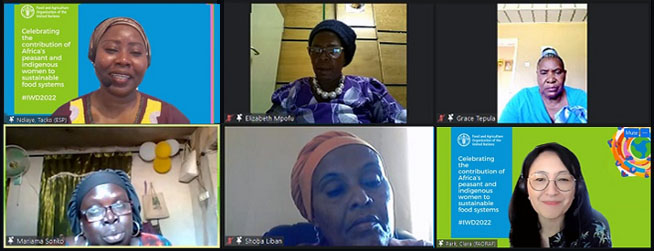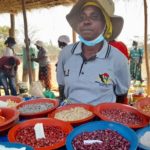
Article originally published @ fao.org
Celebrating the contributions of rural and indigenous women to healthy food systems and a sustainable tomorrow
Around a third of the world’s food is produced by smallholder farmers on less than two hectares of land. In Sub-Saharan Africa, the percentage is much larger, with some 60 percent of the population engaged as smallholder farmers in food production and processing. At least half of these farmers are women, who specialise in seeding, weeding, transplanting, harvesting, post-harvest work, processing, marketing and, in some areas, land preparation.
This year’s International Women’s Day recognized the contributions of women and girl leaders and change-makers around the world who are fighting for sustainability in the face of the ongoing climate crisis. Despite their crucial role in agrifood systems, women are faced with enormous challenges, including exclusion from decision-making, denial of essential productive resources such as land, water, credit, information, and technologies, and disregard for their deep knowledge of local contexts. In addition, they are disproportionately affected by climate and weather-related disasters, constituting 80 percent of people displaced by climate change.
On 9 March, the FAO Regional Office for Africa paid special tribute to African rural and indigenous women and their contribution to climate action and sustainable agrifood systems transformation through an interactive online dialogue with leaders from the African Women’s Collaborative for Healthy Food Systems and ENDA Pronat. The virtual celebration highlighted how rural and indigenous women are actively promoting healthy food systems through agroecology, regenerative approaches, and indigenous foodways.
Challenges to women producers in Zambia and Uganda
In the Central Province of Zambia, interviews by the African Women’s Collaborative for Healthy Food Systems revealed that many women had no control over the land they use for farming, which belongs to their spouse or relatives. “We have land, but to use it for farming, I have to seek permission from my husband, who decides on the type of crops to grow and how to use the proceeds from our sales,” said Universe Mafuta Mazaba. Restina Mumba, a Petauke-based farmer. She said how hard it has been for her to acquire land from the traditional leaders: “The chiefs should help us not only to access land but also give us certificates for our land, so that our children can also benefit from it. This is the time to advocate for our rights. We want to be independent to grow food that has nutritional value.”
In Uganda, female small-scale farmers are facing growing competition for land. Nagitta Rose, a 57-year-old farmer in the Mityana district was once a prominent farmer whose produce was enough to feed the entire community. Unfortunately, her husband was involved in a motorcycle accident, which left him bedridden and unable to protect their land. Since then, their 5-acre farm has been facing different claims of ownership. With no title deed and formal proof of ownership, Nagitta is at a loss to defend the land from encroachers.
Limited access to financial resources and credit exacerbates the challenges faced by these women, who are often excluded from land entitlement schemes and may have difficulties understanding lending policies due to reduced access to education. To further complicate their situation, rural and indigenous women are confronted with unreliable seed storage facilities, which represents a threat to food security in the local communities, since much of the food produced comes from their seeds.
Resilience through agroecology
Notwithstanding the financial, legal, environmental and technical obstacles posed, rural women farmers continue to show admirable tenacity. A key ally in empowering these women to continue working the land is agroecology. Agroecological approaches include diversification of crops, conservation tillage, green manures, organic compost, biological pest control and rainwater harvesting.
In Zimbabwe, for example, women have been using traditional knowledge passed down from their ancestors to control pests and diseases without having to depend on chemical pesticides. Nyengeterai Munyani, a vibrant farmer in her 70s, has seven hectares of land on which she grows small grain crops. To preserve her crops and control pests, she makes use of a variety of organic methods: “I use leaves from paw trees, which I crush while they are fresh and mix with water. I spray my crops with this solution and that deals with the pests and diseases. There are also indigenous trees like mutsviri and mutovhoti whose barks we burn and sprinkle the ashes on our crops.” In the Masvingo province, producer Gogo Mumvuri also practices diversified farming and organic methods of pest and disease control to lessen environmental impact. “When I plant different crops on the same piece of land at the same time, it reduces pests. I also use bark from trees in our area like the mukonde tree, whose ashes get rid of pests,” she said.
The adoption of agroecology has also united local communities by providing sharing and learning opportunities for rural women farmers. In the Shashe region of Mashava, Zimbabwe, Vongai Mudzingwa, a 48-year-old seed custodian, explained how agroecology reduced her farming workload, improved her social life, and united her community: “When planting and harvesting, we call our neighbours and work together as a team. This has fostered unity among us. We are now united because we make use of mushandirapamwe.” Mushandirapamwe is a Shona word that loosely translates to working together as one, and it is a very common practice among women seed custodians in Shashe. “Thanks to agroecology, we even have free time on our hands. As women seed custodians, we formed a stokvel (club) where we meet every Thursday to share agroecology farming ideas and exchange seeds, as well as other kitchen equipment and groceries we buy with money we get from selling our farm produce,” she added.
African rural and indigenous women remain undeterred in their commitment to the practice of agroecology and continue to play crucial roles in maintaining healthy food systems.
International Women’s Day reminds us that every day should be dedicated to recongizing and supporting women such as Universe, Restina, Nagitta, Nyengeterai, Gogo and Vongai. It reminds us that we have a critical role to play in tackling discrimination in women’s access to land and natural resources, and addressing gender gaps in rural education, training and finance. Breaking legal and cultural barriers to women’s full engagement in agrifood systems is key to achieving better production, better nutrition, a better environment, and a better life – leaving no one behind.
